'February 22 (53) was followed by Terminalia (54)
↔ E:54.
... The leap day was introduced as part of the Julian reform.
The day following the Terminalia (February 23) was doubled,
forming the 'bis sextum - literally 'double sixth', since
February 24 was 'the sixth day before the Kalends of March'
using Roman inclusive counting (March 1 was the 'first day').
Although exceptions exist, the first day of the bis sextum
(February 24) was usually regarded as the intercalated or
'bissextile' day since the third century. February 29 came to be
regarded as the leap day when the Roman system of numbering days
was replaced by sequential numbering in the late Middle Ages ...
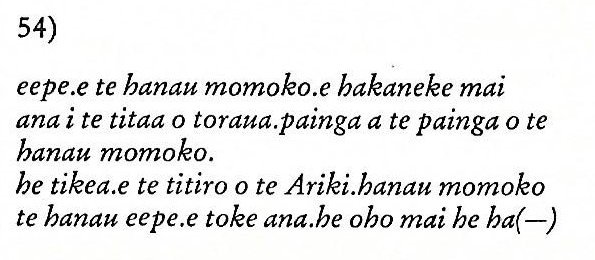
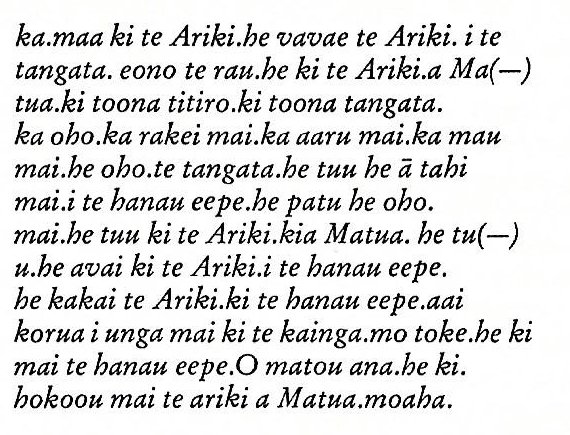
|
E:52 |
|
eaha te ngaru.he ki
hokoou mai a Ira.e
haka(-) |
Then Uure asked [he
ki mai a Uure],
'Why (does one need) the wave?' [e-aha
te ngaru]
|
| Ê,
yes. E ... é disjunct vocative marker. E
vovo é! Girl! E te matu'a é! Father!
(Vanaga) 1. By. 2. And. 3. Oh! 4. Yes. 5. Verb sign.
6. Negative verb sign; e maaa, inexperienced;
ina e, negative sign; ina e rakerakega,
innocent; ina e ko mou, incessant; e ko,
not, except. 7. Wave. 8. Weak demonstrative,
functioning as article. (Churchill) |
|
eke mai ana te ngaru.he
hakatere a te rara ma(-) |
Again Ira
replied [he ki
hokoou mai a Ira], 'While riding [haka-eke]
the wave, it if moves [he
haka-tere] to the right [a
te rara mata'u], the eye looks diagonally
[he hira]
toward the right side, and the ornament [te
rei] of Ruhi shines forth [he
rapa]. If the wave moves in the direction
from where the shine comes (from the left) [a
te rapa mai], then the ornament of Pu
shines forth. If the movement of the wave is toward
the middle [a te
tini], then the mother-of-pearl necklace
[te
tuitui reipá]
shines [he rapa mai]
around the neck of the figure of Hinariru. |
|
tau.he hira atu tou
mata a te rara matau. |
|
he rapa mai te rei.i a
ruhi.he hakatere he haka(-) |
|
hoki .te ngaru a te
rapa.mai.he rapa mai te rei |
|
o pu.he hakahoki mai te
ngaru a te tini. he rapa |
|
mai te tuitui reipa.mai
runga i te ngao o te moai |
|
o hinariru.i papa o
rae. |
| Eke.
To climb, to mount, to mount (a female for
copulating), to surface (of fish), and by extension,
to bite; he eke te kahi the tuna bites.
Vanaga. Trestle, stilt; to mount a horse, to go
aboard. Hakaeke, to cause to mount, to carry
on a boat. P Pau.: fakaeke, to transport, to
carry, to hang up. Mgv.: eke, to embark, to
mount upon an elevation. Mq.: eke, to rise,
to go aboard; hakaeke, to heap up, to put
upon, to raise. Ta.: ee, to mount, to go
aboard; faaee, to hang up, to transport by
water. Churchill.
Tere.1.
To run, to flee, to escape from a prison. 2. To sail
a boat (also: hakatere); tere vaka,
owner of a fishing boat. 3. (Deap-sea) fisherman;
tere kahi, tuna fisherman; tere ho'ou,
novice fisherman, one who goes deap-sea fishing for
the first time. Penei te huru tûai; he-oho te
tere ho'ou ki ruga ki te hakanonoga; ana ta'e
rava'a, he-avai e te tahi tagata tere vaka i te îka
ki a îa mo hakakoa, mo iri-hakaou ki te hakanonoga i
te tahi raá. The ancient custom was like this:
the novice fisherman would go to a hakanonoga;
if he didn't catch anything, another fisherman would
give him fishes to make him happy so he'd go again
one day to the hakanonoga (more distant
fishing zones where larger fishes are found).
Vanaga. To depart, to run, to take leave, to desert,
to escape, to go away, to flee, fugitive, to sail,
to row, to take refuge, to withdraw, to retreat, to
save oneself; terea, rest, defeat; tetere,
to beat a retreat, to go away, refugee; teretere,
to go away, hurrah; hakatere, to set free, to
despatch, to expel, to let go, to liberate, to
conquer, helmsman; terega, departure,
sailing; teretai, a sailor. Churchill.
Hira. To turn the eyes away, to leer.
Hakahira; mata hakahira, squint-eyed. P
Mq.: hiri, crosseyed. Ta.: hira,
bashfulness; hihira, to look askance. To.:
hila, to look askant. Churchill. Mgv..: hira,
frank and hardy. Ta.: hirahira, bashful
(sense-invert). Ma.: hihira, shy. Churchill.'
Rapa.
1. To shine; shiny, polished; he-rapa te moai
miro, the wooden figurine is shiny, polished. 2.
Emblem, badge of timo îka (person entrusted
with putting a death spell on an assassin).
Rapahago, name of a spirit (akuaku),
anciently considered as benevolent; rapahago,
a fish. Raparapa, to dazzle; dazzled:
he-raparapa te mata. Marîa raparapa,
calm, smooth shiny sea. Vanaga. 1. Pau.: rapa,
a fool, madness. Ma.: rapa, a familiar
spirit. 2. Pau.: rapa, blade of a paddle.
Mgv.: raparapahoe, id. Ta.: rapa, id.
Mq.: apa, id. Sa.: lapa, flat. Ma.:
rapa, flat part of a shovel. 3. Pau.: rapae,
a sand-pit. Ta.: rape, arapai, id. 4.
Mgv.: rapahou, primipara. Ma.: rapoi,
id. 5. Mgv.: raparapa, green. Ta.: rapa,
id. 6. Mgv.: raparapa, flat. Ta.: rapa,
a flat rock. Sa.: lapalapa, a flat coral.
Ma.: raparapa, the flat part of the foot. 7.
Ta.: raparapa, square. To.: labalaba,
id. Ha.: lapalapa, square (of timber, of a
bottle, of a cow yard). Churchill.
Rei,
1. To tread, to trample on: rei kiraro ki te va'e.
2. (Used figuratively) away with you! ka-rei
kiraro koe, e mageo ê, go away, you disgusting
man. 3. To shed tears: he rei i te mata vai.
4. Crescent-shaped breast ornament, necklace;
reimiro, wooden, crescent-shaped breast
ornament; rei matapuku, necklace made of
coral or of mother-of-pearl; rei pipipipi,
necklace made of shells; rei pureva, necklace
made of stones. 5. Clavicle. Îka reirei,
vanquished enemy, who is kicked (rei).
Vanaga. T. 1. Neck. 2. Figure-head.
Rei mua =
Figure-head in the bow.
Rei muri = Figure-head in the stern.
Henry. Mother of pearl;
rei kauaha,
fin. Mgv.: rei,
whale's tooth. Mq.:
éi, id. This is probably associable with
the general Polynesian
rei, which
means the tooth of the cachalot, an object held in
such esteem that in Viti one tooth (tambua)
was the ransom of a man's life, the ransom of a soul
on the spirit path that led through the perils of Na
Kauvandra to the last abode in Mbulotu. The word is
undoubtedly descriptive, generic as to some
character which Polynesian perception sees shared by
whale ivory and nacre.
Rei kauaha
is not this rei;
in the Maori
whakarei designates the carved work at
bow and stern of the canoe and Tahiti has the same
use but without particularizing the carving:
assuming a sense descriptive of something which
projects in a relatively thin and flat form from the
main body, and this describes these canoe ornaments,
it will be seen that it might be applied to the fins
of fishes, which in these waters are frequently
ornamental in hue and shape. The latter sense is
confined to the Tongafiti migration. Reirei,
to trample down, to knead, to pound. Pau.:
Rei-hopehopega, nape. Churchill. |
|
evau kainga e hakahi
mai ai e tooku matua |
My father [tooku
matua]
fished (? hakahi)
the eighth land, that is, Te Pito O Te Kainga (like
a fish), to own it (as a possession) [mo
rava'a]. |
|
ko te pito o te
kainga.mo ravaa. |
| Hi.
1. To have a headache (subject: roro, brain).
Ku hí á tooku roro, I have a headache. 2. to
fish; hí-kau, to fish while swimming. 3. To
blow one's nose. Vanaga. 1. To angle. Mgv.: hi,
hipo, to fish with a line. Mq., Ta.: hi,
id. 2. Asthma, to wipe the nose; hihi, to
have a cold. Churchill.
.jpg) |
|
ehitu kainga eko
ravaa.i roto i te nehunehu |
Seven lands
are lost [ekó
rava'a] in the midst of dim twilight.
Once it is lost, eight groups of people (i.e.,
countless boat crews) can't find it again during the
fast journey.' |
|
kapuapua evaru kaukau
eko ravaa.i te pei |
|
ana ka ngaro ro era.ka
runu tokoa no mai |
Makoi
absorbed the text [te
kupu] to himself. Ira and the three were
sleeping [he
hauru. a kua Ira.a
totoru.]. |
|
a Makoi.i te kupu.he
hauru. a kua Ira.a to(-) |
|
toru. |
|
Runu. To
take, to grab with the hand; to receive, to welcome
someone in one's home. Ko Timoteo Pakarati
ku-runu-rivariva-á ki a au i toona hare, Timoteo
Pakarati received me well in his house. Runurunu,
iterative of runu: to take continuously, to
collect. Vanaga. 1. To pluck, to pick, a burden. 2.
A substitute; runurunu, a representative. Churchill.
Ku garo á te kupu o te tai i a au. I have
forgotten the words of the song (lit. the words of
the song have become lost to me). Vanaga. |
|
E:53 |
|
he ki mai a Makoi.kia
Uure.ku runu tahi |
Makoi said
to Uure, 'I have absorbed the speech completely,
down to the last detail (?
ku paepae-tahi-mai-ana).'
Then Uure said to Makoi, 'Keep the speech a
secret - this is something that the (other) young
men shall not find out.'
|
|
mai ana.tau ki era e
āu.ku paepae tahi mai |
|
ana.he ki hokoou mai a
Uure.kia Makoi |
|
kia
kiva koe i te ki. he
mee o hakamaa |
| Kumu.
To draw back, to withdraw. Kukumu, cheek;
kukumu kivakiva, dourness. Churchill. Mgv.:
kumu, the fist. Ma.: kumu, id.
Kukumu, 1. To close the fist. Ta.: uumu,
id. Sa.: 'u'u, id. Ma.: kumu, to
clench the fist. 2. To press, to squeeze. Ta.:
uumu, id. Kumukumu, to prepare small
portions of food pressed with the hand. Ta.: umua,
to make into balls, to press, to wring. Mq.:
kumu-hei, a small bundle of fragrant herbs. Ma.:
kumu, to bring in the hollow of the hand.
Churchill.
Rutu.
1. To read, to recite, to pronounce words solemnly;
he-rutu i te kohau motu, to read the
rongorongo tablets; hare rutu rogorogo mo
hakama'a ki te ga poki ite kai, i te rogorogo,
rongorongo school, house in which children were
taught reading and writing the rongorongo signs. 2.
To pelt with stones. 3. To gather in great numbers
(of people). Vanaga. Sound. Rutu-rongorongo =
the sound of recitation. Barthel. T. Beat. Henry. To
recite; tae rutu, irreverence. Churchill.
Pau.: rutu, a drum. Mgv.: rutu, to
beat, to cause to resound. Ta.: rutu, a drum,
to drum. Mq.: utu, to drum. Sa.: lutu,
to shake a rattle. Churchill. |
|
ki te
ngaio ena.Veriheka.Ika
Hiva. Tori. |
[to these youngsters -
ki te ngaio ena - (viz) Veriheka,
Ika Hiva, (. ) and Tori.] |
|
... They all
went up to the yam plantation of Kuukuu.
Once they had arrived there, Ira stayed for one
month [etahi marama]. (Ika Hiva is
cited as the source of this tradition.)
[???] ...
anake ki te uhi a Kuukuu.he tuu he noho a Ira
etahi marama. i roto i a
Ika hiva.(1)
... [E:47]
... Ana Roto was
a name for Spica. And if a Beaver (Lat. Castor)
could be referred to as Kiore Hiva, then his
immortal brother visible up in the sky together with
his father might have been referred to as Ika
Hiva. ...
Fish are actually unable to close
their eyes, and the fact that 'when the fish sleeps
it does not close its eyes' was noticed by ancient
Indians. The dot-in-a-circle similar to that
occuring among the trefoils of the Harappan
priest-king's robe is identical with the eye of the
many small hare- and fish-shaped amulets discovered
on the lower levels of Harappa
...
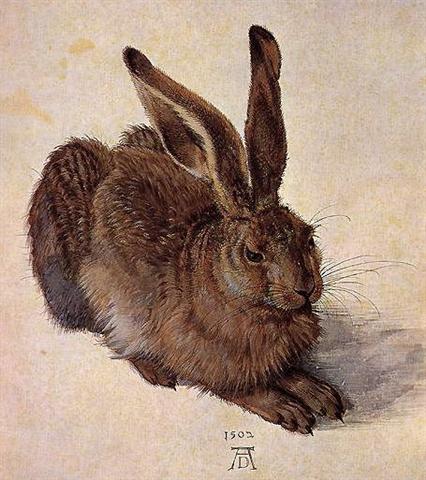 |
|
Harakura. |
[(and) Harakura.] |
|
Hara. Harahara 1. Misaligned (of roofing,
basketware, etc.); e harahara nó te kete, the
basket is misaligned
(its strips are not parallel. 2. A sort of taro. 3.
Latrine, defecating ground. Vanaga. 1. Pandanus. P
Mgv.: ara, puhara, pandanus (tree);
hara, a bunch of pandanus fruit, old pandanus.
Mq.: faá haá, pandanus. Ta.: fara, id.
2. Error, mistake, oversight, wrong; to err, to
confound, to mistake; manau hara, illusion;
toua hara, discussion without knowing the
object. P Mgv.: ara, arara, defective,
abortive, to miss, to fail, a fault, a quarrel;
hara, a fault, a mistake, an error, a dispute, a
quarrel, undisciplined. Mq.: hara, a rake,
libertine. Ta.: hara, sin, fault, crime.
Churchill. ... They go inland at the land. The child nursed and
tended grows up, is able to go and play. Each day he
now goes off a bit further away, moving some
distance away from the house, and then returns to
their house. So it goes on and the child is fully
grown and goes to play far away from the place where
they live. He goes over to where some work is being
done by a father and son. Likāvaka is the
name of the father - a canoe-builder, while his son
is Kiukava. Taetagaloa goes right over
there and steps forward to the stern of the canoe
saying - his words are these: 'The canoe is
crooked.' (kalo ki ama). Instantly
Likāvaka is enraged at the words of the child.
Likāvaka says: 'Who the hell are you to come
and tell me that the canoe is crooked?'
Taetagaloa replies: 'Come and stand over here
and see that the canoe is crooked.' Likāvaka
goes over and stands right at the place
Taetagaloa told him to at the stern of the
canoe. Looking forward, Taetagaloa is right,
the canoe is crooked. He slices through all the
lashings of the canoe to straighten the timbers. He
realigns the timbers. First he must again position
the supports, then place the timbers correctly in
them, but Kuikava the son of Likāvaka
goes over and stands upon one support. His father
Likāvaka rushes right over and strikes his son
Kuikava with his adze. Thus Kuikava
dies. Taetagaloa goes over at once and brings
the son of Likāvaka, Kuikava, back to
life. Then he again aligns the supports correctly
and helps Likāvaka in building the canoe.
Working working it is finished ...
Kura. 1. Also: poukura,
the short, thin, multicoloured feathers of chickens
and other birds. 2. The best of something, choice.
Vanaga. Tutui kura, shawl. Kurakura,
fair, light. Hakakurakura, to make to blush.
P Pau.: kurakura, red, violet. Mgv.:
kurakura, red, yellow, scarlet. Mq.: uáuá,
red, ruddy. Ta.: uraura, red. Churchill. |
|
... During the
time of Ataranga, the
people built boats, put them into the water, went on
board, and sailed off (across the sea) to find a
land where people could (safely) live. During the
time of Taana,
Taana spoke to his three sons:
'Untie your boat [double-canoe,
tokorua
vaka],
fellows! Sail away and look for the land where the
great king can live (safely in the future)!' The
boat anchored in front of the three (islets) Motu
Nui, Moto Iti, and Motu Kaokao. They had sailed away
and had looked for the (new) land, but the boat did
not return to its homeland, Maori.
... Based upon the
fact that toko in New Zealand also means
'rays of light', it has been suggested that the
original props which separated and held apart Sky
and Earth were conceived of as shafts of dawn
sunlight.
Many people
perished during the time of Taana. Taana spoke to
his assistants (titiro): 'Pick up the keel
and lay it down (at the building site) and construct
a boat (miro), young men! The boat shall be
for the people (mahingo) and also for the
king, so that we can all set out and look around to
see whether there isn't (somewhere) (the possibility
of) escape for the people.'
They built the boat during the
time of Taana. Thus, everything remained (in its
place) until Taana died. Taana passed on his royal
power to Matua.
Matua established himself (as ruler). They
built boats during the time of Hotu ... (E:5)
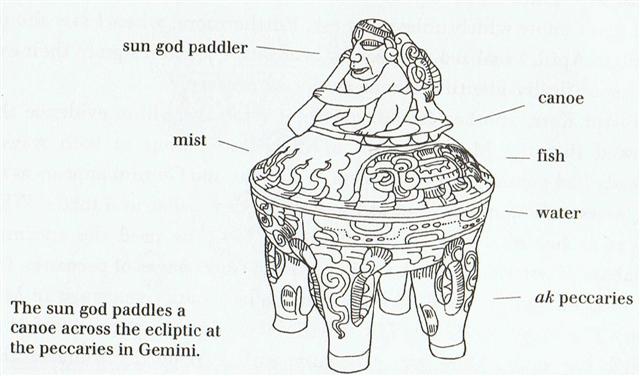 |
Terminalia marked where the old year ended. It was the
border line - te tita'a koîa - and when the people of
Hanau Eepe moved the border line to increase their land it
could have referred to how the Sun year gradually came earlier due to the
precession, eventually motivating a shift in the calendar
structure. And it could also have alluded to how it was necessary to
add a bissextum day every 4th year.
Hanau Eepe increased their land when Matua A Taana was ruler,
the father of Hotu A Matua. Possibly, therefore, this theft indicated
a shift in Roman times - 27 right ascension days earlier - viz.
when Julius Caesar increased the length of the calendar year
with 10 days.
|
ko oto uta |
ariki motongi |
1 |
Hamal
(*30) |
|
ko tangaroa.a oto uta |
ariki motongi |
2 |
(*57) |
|
ko tiki hati.a tangaroa |
ariki motongi |
3 |
(*84) |
|
ko roroi.a tiki hati |
ariki motongi |
4 |
(*111) |
|
ko tuu kumā.a roroi |
ariki motongi |
5 |
(*138) |
|
ko ataranga.a tuu kumā |
ariki motongi |
6 |
Alkes (*165 = 348 -
183) |
|
ko
harai.a ataranga |
ariki motongi |
7 |
Bharani
(*41) |
|
ko taana.a harai |
ariki motongi |
8 |
Aldebaran (*68) |
|
ko
matua.a taana |
ariki motongi |
9 |
Canopus (*95) |
|
ko
hotu.a matua |
ariki motongi |
10 |
|
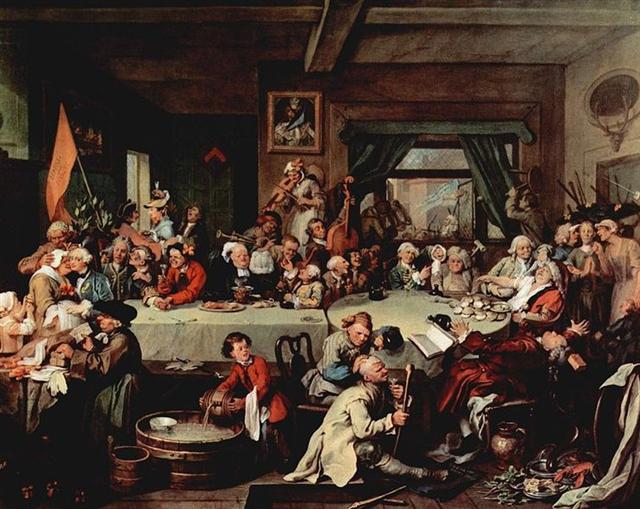
... The ordinary year in the previous Roman calendar consisted
of 12 months, for a total of 355 days. In addition, a 27-day
intercalary month, the Mensis Intercalaris, was sometimes
inserted between February and March. This intercalary month was
formed by inserting 22 days after the first 23 or 24 days of
February; the last five days of February, which counted down
toward the start of March, became the last five days of
Intercalaris. The net effect was to add 22 or 23 days to the
year, forming an intercalary year of 377 or 378 days ...
|
i te tau i a Matua.he
too mai a Matua i te |
During his
reign, Matua took this royal powers (the pahera ariki)
and passed them (on) to [he avai kia] Hotu. Hotu
Matua became the ruler.
During the reign of Matua, the Hanau Eepe came [he
ea]. They stole [he toke] one side (etahi
painga) of the land of he king of Hanau Momoko and
moved [he hakaneke] the border [te tita'a koîa]
from their side toward the side of the Hanau Momoko.
Five hundred [erima te rau] Hanau Eepe stole the
land of the king of the Hanau Momoko. |
|
pahera ariki.he avai kia Hotu.he
hakatuu |
|
i te ariki.ko Hotu.a
Matua.i te tau i a Matua. |
|
he ea
mai te hanau eepe.he toke
etahi
pai- |
|
nga.o
te kainga.o te Ariki. hanau momoko. |
|
he hakaneke mai i
te titaa.o toraua |
|
painga. a te painga o te
hanau momoko. |
|
erima
te rau.te hanau eepe.i toke ai i te kainga |
|
o te ariki hanau momoko.he
tikea te hanau. |
|
Too. 1. To
adopt, to take, to acquire, to admit, to accept, to
gather, to dispose, to seize, to pull up, to extirpate,
stripped, to withdraw, to intercept, to frustrate, to
touch, to employ, to serve;
tae too, to renounce. Mq.:
too, to take,
to receive, to accept, to adopt, to seize, to pull up.
2. Raa too,
noon. 3. Numeral prefix. P Mgv.:
toko, id.
Mq.: toko,
too, id. Ta.:
too, id.
Samoa and Futuna use
to'a and toka,
Tonga and Niuē use toko,
and the remainder of Polynesia uses the latter form.
Tooa: kai tooa, intact, entire, whole;
paea tooa, to deprive. Churchill.
Paka. 1.
Dry; to become dry (of things); pakapaka, to dry
out. Te paka is also the name of the moss-covered
areas, between the small lakes of volcano Rano Kau,
through which one can pass without getting one's
feet wet. 2. To go, to depart; he-paka-mai, to
come; he-oho, he-paka, they go away. 3. To become
calm (of the sea): ku-paka-á te tai. Pakahera,
skull, shell, cranium; pakahera puoko tagata,
human skull; pakahera pikea, shell of crab or
crayfish. Gutu pakapaka, scabbed lips. Hau
paka, fibres of the hauhau tree, which were
first soaked in water, then dried to produce a strong
thread. Moa gao verapaka, chicken with bald neck.
Ariki Paka, certain collateral descendents of
Hotu Matu'a, who exercised religious functions.
Vanaga. 1. Crust, scab, scurf; paka rerere,
cancer; pakapaka, crust, scabby. 2. Calm, still.
3. Intensive; vera paka, scorching hot; marego
paka, bald; nunu paka, thin. 4. To arrive, to
come. 5. To be eager. 6. To absorb. 7. Shin T.
Pakahera, calabash, shell, jug. Pakahia, to
clot, curdle, coagulate. Pakapaka, dry, arid,
scorching hot, cooked too much, a desert, to fade away,
to roast, a cake, active; toto pakapaka,
coagulated blood; hakapakapaka, to dry, to broil,
to toast. Pakahera pikea, shell of crab or
crayfish. Churchill.
... Up to the present time, fertility
spells for fowls have played an important role.
Especially effective were the so-called 'chicken skulls'
(puoko moa) - that is, the skulls of dead chiefs,
often marked by incisions, that were considered a source
of mana. Their task is explained as follows: 'The
skulls of the chiefs are for the chicken, so that
thousands may be born' (te puoko ariki mo te moa, mo
topa o te piere) ... As long as the source of mana
is kept in the house, the hens are impregnated (he
rei te moa i te uha), they lay eggs (he ne'ine'i
te uha i te mamari), and the chicks are hatched (he
topa te maanga). After a period of time, the
beneficial skull has to be removed, because otherwise
the hens become exhausted from laying eggs ...
Tuu. 1. To
stand erect. 2. Mast, pillar, post. Van Tilburg. 1. To
stand erect, mast, pillar, post; tuu noa,
perpendicular; tanu ki te tuu, to set a post;
hakatu tuu, to step a mast; tuu hakamate tagata,
gallows; hakatuu, to erect, to establish, to
inactivate, to form, immobile, to set up, to raise. P
Mgv., Mq., Ta.: tu, to stand up. 2. To exist, to
be. Mgv.: tu, life, being, existence. 3. To
accost, to hail; tuu mai te vaka, to hail the
canoe. Mgv.: tu, a cry, a shout. 4. To rejoin;
tuua to be reunited. 5. Hakatuu, example,
mode, fashion, model, method, measure, to number. PS
Sa.: tu, custom, habit. Fu.: tuu, to
follow the example of. 6. Hakatuu, to disapprove;
hakatuu riri, to conciliate, to appease wrath. 7.
Hakatuu, to presage, prognostic, test. 8.
Hakatuu, to taste. 9. Hakatuu, to mark,
index, emblem, seal, sign, symbol, trace, vestige, aim;
hakatuu ta, signature; akatuu, symptom;
hakatuua, spot, mark; hakatuhaga, mark;
hakatuutuu, demarcation. Churchill. 1. To arrive:
tu'u-mai. 2. Upright pole; to stand upright (also:
tutu'u). 3. To guess correctly, to work out (the
meaning of a word) correctly: ku-tu'u-á koe ki te
vânaga, you have guessed correctly [the meaning of]
the word. 4. To hit the mark, to connect (a blow). 5.
Ku-tu'u pehé, is considered as... ; te poki to'o
i te me'e hakarere i roto i te hare, ku-tu'u-á pehé poki
ra'ura'u, a child who takes things that have been
left in the house is considered as a petty thief.
Tu'u aro, northwest and west side of the island.
Tu'u haígoígo, back tattoo. Tu'u haviki,
easily angered person.Tu'u-toga, eel-fishing
using a line weighted with stones and a hook with bait,
so that the line reaches vertically straight to the
bottom of the sea. Tu'utu'u, to hit the mark time
and again. Tu'utu'u îka, fish fin (except the
tail fin, called hiku). Vanaga. ... To the
Polynesian and to the Melanesian has come no concept of
bare existence; he sees no need to say of himself 'I
am', always 'I am doing', 'I am suffering'. It is hard
for the stranger of alien culture to relinquish his nude
idea of existence and to adopt the island idea; it is
far more difficult to acquire the feeling of the
language and to accomplish elegance in the diction under
these unfamiliar conditions. Take for an illustrative
example these two sentences from the Viti: Sa tiko na
tamata e kila: there are (sit) men who know. Sa
tu mai vale na yau: the goods are (stand) in the
house. The use of tu for tiko and of
tiko for tu would not produce
incomprehensibility, but it would entail a loss of
finish in diction, it would stamp the speaker as vulgar,
as a white man ... Savage life is far too complex; it is
only in rich civilization that we can rise to the
simplicity of elemental concepts ... Churchill 2.
Ea. To rise, to get up. Ka ea ki táû
rikiriki tâtou. Let's get up and play a little game
of war. Vanaga. To go out, to bring out; ea ki aho,
to send away; raa ea mai, the sun rises; ka ea,
be off. Churchill.
Toke. To
steal; thief; toketoke, to repeatedly steal
things of little value; vî'e toke kenu,
adulterous woman (lit.: woman who steals husbands).
Vanaga. Toke. To dupe, to extort, to usurp;
toketoke, to steal, to rob, to extort, to defraud,
to spoil, thief. Tokea, a dupe. Tokenoho,
intruder. Churchill.
Pae. 1. To
end, to come to an end; ku-pae-á taaku kai, I
have no more food; pae-atu, to leave en masse;
ku-pae-atu-á tagata ki Hangaroa tai. everybody
has left for Hangaroa Bay. 2. To start, to break
out (of wars, fights: taûa); ku-pae-á te taûa,
the fight, the war, has started. 3. Dressed, edged
stones anciently used to enclose a permanent umu;
paepae wall of undressed stones built as
protection against the wind; also any other protection.
Pa'e: Of a boat, to deviate, to drift, to stray
under the effects of currents or winds; ku-pa'e-á te
vaka i te tokerau, the wind has made the boat
deviate from its course. Vanaga. Paega: 1.
Dressed stones forming the foundations of the ancient
houses or of the walls of the monumental ahus;
hare paega, house with stone foundations;
paega-ahu, ahu wall. 2. Household, people who live
in a hare paega. 3. To lay stones on the bottom
and against the sides of a hole: he-paega i te rua.
Vanaga. 1. Enough. 2. Division of a subject (paiga).
Pau.: paega, a party, a side. Ta.: pae,
division, part. 3. Threshold, sill, joist. P Ta.: pae,
sill, joist. 4. To exhaust, to finish, past; e ko pae,
impregnable; hakapae, to exhaust, to finish, to
end, to execute, to accomplish, to conclude, to
consummate, to consume, to achieve, to acquit. Paea:
1. Enough, past. 2. To decay, to waste away; paea
tooa, to deprive. Paega, foundation.
Paepae, pavement, plank, canoe; hakapaepae,
to lay planks, to floor. P Pau.: paepae, a raft.
Mgv.: paepae, a pavement, to lay up stones with
regularity into a wall. Mq.: paepae, elevated
pavement on which the house is built. Ta.: paepae,
pavement, raft. Paero, all, totalit, to sweep off
all. Churchill.
... Der Cultus bestand in Anrufung
der Götter, deren Willen der Priester erklärte, in
Opfern an Lebensmitteln, auch an Menschen, und in der
Feier gewisser, zu bestimmten Zeiten wiederkehrender
Feste (rakauti), von denen das erste im Früjahr 2
Monate dauerte, das zweite im Sommer mit der Errichtung
einer Pyramide aus Zweigen (paina) endete, das
dritte in den Winter fiel; bei allen fanden Tänze,
Gesänge, Spiele aller Art statt ...
Koîa, exact: tita'a koîa, exact
demarcation. Vanaga. |
|
E:54 |
|
eepe.e te hanau momoko.e
hakaneke mai |
The assistant (titiro)
of the king of the Hanau Momoko saw [he tikea]
that the Hanau Eepe were stealing (the land). |
|
ana i te titaa o
toraua.painga a te painga o te |
|
hanau momoko. |
|
he tikea.e te titiro o te
Ariki.hanau momoko |
He went [he
oho] and reported it [haka-ma'a] to the king
[ki te Ariki]. |
|
te hanau eepe.e toke ana.he
oho mai he ha(-) |
| Ariki.
1. King, ruler, member of the nobility, Ariki henua,
king; members of the royal family, descending from
Hotu Matu'a; noble, nobility, chief. 2. Divine
being, superior being. Ariki Paka, certain
collateral descendents of Hotu Matu'a, who
exercised religious functions. Vanaga. Chief, king,
lord, headman in general. Hakaariki, to make one
a king. P Pau., Mgv.: ariki, chief. Mq.: aiki,
id. Ta.: arii, id. The Marquesan use both aiki
and hakaiki in the same sense; the latter forms
with Mangarevan akariki a subordinate couple in
Southeast Polynesia. Since akariki is the only
form in Mangareva and the Marquesas have both we may
regard this as indicative of the influence of Mangareva
upon the Marquesas. In Tonga we find only eiki;
the vowel change is quite in the Tongan manner, the
dropping of the liquid is most unusual; the eiki
form appears once more in Mangarevan ataeiki
(also a language in which it is unusual to drop the
liquid) in the sense 'to do nothing and to dress richly
in a luxurious way'. Churchill. ALII, s.
Haw., a euph., a king, a chief. Rarot., Paum.,
ariki, id. Fakaafo, aliki, id. Mangar.
akariki, id. Tong., eiki, id. Marqu., aiki,
hakaiki, id. N. Zeal., ariki, chief and
high-priest. Tah., arii, chief. Sam., alii,
chief. Sanskr., rij (for primitive Vedic râj,
to govern, Benfey), to stand or be firm, be strong;
râj, râjan, king. Goth., reiki,
dominion; reiks, king, chief. Sax., rik,
noble; rici, dominion, state. Icel., rikr,
in compounds as ul-rikr, e-rikr. Swed.,
rik, rich; riki, kingdom. Irish, righ,
king; airigh, chief. Welsh, -rix, a
frequent suffix in the names of nobles. Zend, raĝi,
kingdom (A. Pictet). Lat., rex,
king; rego,
rectus.
Fornander.
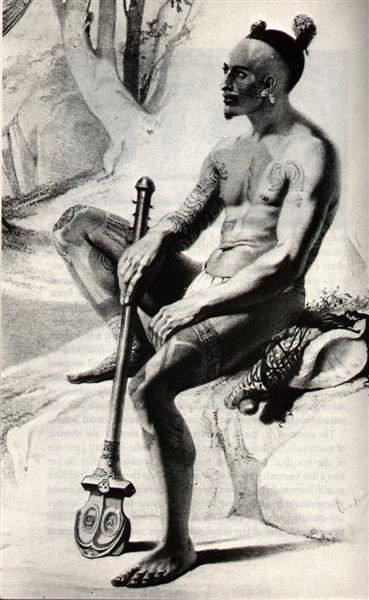 |
|
ka.maa ki te Ariki.he vavae
te Ariki. i te |
The king
assigned [he vavae] six hundred [eono te rau]
men. |
|
tangata.
eono te rau.he ki
te Ariki.a Ma(-) |
|
Vae. Va'e: Foot,
leg; te va'e mata'u, te va'e maúi, right foot,
left foot. Va'e ruga, va'e raro, quick and light,
without detour (lit.: foot up, foot down). Ka-oho koe
ki a nua era va'e ruga va'e raro, ina ekó hipa-hipa,
hurry straight to your mother, do not make any detours.
Va'e pau, misshapen foot, clubfoot. Vae,
to choose. Vaega, middle, centre; i vaega o,
in the middle of. Vanaga. 1. Foot, paw, leg, limb;
vae no roto, drawers; karikari vae, ankle. P
Pau.: vaevae, foot, leg. Mgv.: vaevae, id.
Mq.: vae, id. Ta.: vaevae, avae,
id. 2. Pupil. 3. To choose, elect, prefer, promote,
vote; vavae, to destine, to choose; vaea (vae
2), pupil. Vaeahatu (vae 1 - ahatu):
moe vaeahatu, to sleep sprawling with legs
extended. Vaega, center, middle, within, half;
o vaega, younger; ki vaega, among, between,
intermediate. P Pau.: vaega, the middle. Mgv.:
vaega, center, middle. Mq.: vaena, vavena,
vaveha, id. Ta.: vaehaa, half.
Vaehakaroa (vae 1 - roa): moe
vaehakaroa, to sleep with legs stretched out.
Vaehau (vae 1 - hau 3), pantaloons,
trousers. Vaeherehere (vae 1 - here
1), to attach by the paw. Vaerere (vae 1 -
rere 1), to run. Churchill. Ta.: 1. Timbers of a
boat. Ha.: wae, knees, side timbers of a boat. 2.
To share out. Sa.: vae, to divide, to share. Ma.:
wawae, to divide. Churchill. |
|
tua.ki toona titiro.ki
toona tangata. |
King Matua said
[he ki te Ariki.a Matua] to his assistant and to
his men, 'Go [ka oho] and carry out this order!
Seize [ka aaru] them and bring (them) to me!' |
|
ka oho.ka rakei mai.ka aaru
mai.ka mau |
| Aaru.
To grasp, to grip, to grab, to hold: ka-aaru hiohio i
te ura, hold the lobster firmly. Vanaga. 1. To
raise; aaru ki te rima, to raise the arm. 2. (haruharu,
aruaru). Churchill. |
|
mai.he oho.te tangata.he
tuu he ā tahi |
The men went on
their way [he oho.te tangata], reached the Hanau
Eepe, and surrounded [he patu] them. |
|
mai.i te hanau eepe.he patu
he oho. |
|
Patu. 1. To
abandon, to throw away, to quit, to omit; to unclothe,
to let down the hair; pati ki te kahu, to
undress; patu toona rake, immodest. Mq.: patu,
to throw from one place to another, to throw with the
fingers. Ta.: patu, to throw away. 2. To come
into leaf, to unfold. 3. To lead away, to turn aside, to
dodge; patu mai, to lead to, to bring.
Patupatu, page. Churchill. Pau.: 1. Patu, to
build, structure, wall. Ta.: patu, wall, to
build. Ma.: patu, a wall. 2. To kill, to beat.
Mgv.: patu, to strike, war. Ta.: patu, to
strike with a mallet. Ma.: patu, to strike, to
kill. Churchill. Mq.: Patu hakiuka, bloating of
the body. Sa.: patu, a fatty tumor. Churchill.
Hatu. 1. Clod of earth; cultivated land; arable
land (oone hatu). 2. Compact mass of other
substances: hatu matá, piece of obsidian. 3.
Figuratively: manava hatu, said of persons who,
in adversity, stay composed and in control of their
behaviour and feelings. 4. To advise, to command. He
hatu i te vanaga rivariva ki te kio o poki ki ruga ki te
opata, they gave the refugees the good advice not to
climb the precipice; he hatu i te vanaga rakerake,
to give bad advice. 5. To collude, to unite for a
purpose, to concur. Mo hatu o te tia o te nua, to
agree on the price of a nua cape. 6. Result,
favourable outcome of an enterprise. He ká i te umu
mo te hatu o te aga, to light the earth oven for the
successful outcome of an enterprise. Vanaga. 1. Haatu,
hahatu, mahatu. To fold, to double, to
plait, to braid; noho hatu, to sit crosslegged;
hoe hatu, clasp knife; hatuhatu, to
deform. 2. To recommend. Churchill. In the Polynesian
dialects proper, we find Patu and Patu-patu,
'stone', in New Zealand; Fatu in Tahiti and
Marquesas signifying 'Lord', 'Master', also 'Stone';
Haku in the Hawaiian means 'Lord', 'Master', while
with the intensitive prefix Po it becomes
Pohaku, 'a stone'. Fornander. |
|
mai.he tuu ki te Ariki.kia
Matua. he tu(-) |
They came back
to King Matua and handed the Hanau Eepe over to him. |
|
u.he avai ki te Ariki.i te
hanau eepe. |
|
he kakai te Ariki.ki te
hanau eepe.aai |
The king
reproached [he kakai] the Hanau Eepe severely,
'Who sent you out to steal the land?' The Hanau Eepe
answered, 'We ourselves did!' [O matou ana.he ki.] |
|
korua i unga mai ki te
kainga.mo toke.he ki |
|
mai te hanau eepe.O matou
ana.he ki. |
|
hokoou mai te ariki a
Matua.moaha. |
Then [hokoou] Hotu
[???] Matua spoke ... |
| Kakai.
To blame, to chide, to
scold, to disapprove, to expel, to reproach, to rebuke;
debate, anger, dispute, discussion, quarrel,
reprehension, reprimand, hostility; ivi kakai
mai kakai atu, an
inharmonious family; kakai rae,
to provoke; kakai nuinui ke,
rage; toua kakai,
to rebuke. Mgv.: kaia,
wicked, cruel. Mq.: kaia,
envious, jealous, shrewish, quarrelsome, wrangling,
surly. Ta.: aia,
despicable. Churchill. |
Hanau. 1. Race, ethnic group. Hanau eepe, the
thick-set race; hanau momoko, the slender race (these
terms were mistranslated as 'long-ears' and 'short-ears'). 2. To
be born. Hanau tama, pregnant woman; vî'e hanau poki,
midwive (also: vî'e hakaa'u). Vanaga. To be born;
vie hanau, midwife. P Pau.: fanauga, child,
descendant, progeny. Mgv.: hanau, to be born, to be
brought into the world. Mq.: fanau, hanau, to be
born, to lie in, to bring into the world. Ta.: fanau, to
be born, to lie in. Churchill.

|


.jpg)




